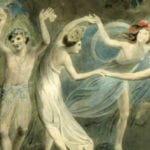 Movies and TV
Movies and TV  Movies and TV
Movies and TV  Humans
Humans 10 Times Scientists Were Absolutely Sure… and Absolutely Wrong
 Our World
Our World 10 Pivotal Moments for Life on Earth
 Movies and TV
Movies and TV 10 Most Realistic Medical TV Shows of All Time
 Creepy
Creepy 10 Eerie & Mysterious Ghosts of the Pacific Coast
 Weird Stuff
Weird Stuff 10 Typos That Accidentally Changed History
 History
History 10 Times Trickery Won Battles
 Technology
Technology 10 Awesome Upgrades to Common Household Items
 Misconceptions
Misconceptions 10 Hilarious (and Totally Wrong) Misconceptions About Childbirth
 Weird Stuff
Weird Stuff 10 Warning Labels That Exist Because Someone Actually Tried It
 Movies and TV
Movies and TV 10 Zombie Movies That Will Actually Terrify You
 Humans
Humans 10 Times Scientists Were Absolutely Sure… and Absolutely Wrong
 Our World
Our World 10 Pivotal Moments for Life on Earth
Who's Behind Listverse?

Jamie Frater
Head Editor
Jamie founded Listverse due to an insatiable desire to share fascinating, obscure, and bizarre facts. He has been a guest speaker on numerous national radio and television stations and is a five time published author.
More About Us Movies and TV
Movies and TV 10 Most Realistic Medical TV Shows of All Time
 Creepy
Creepy 10 Eerie & Mysterious Ghosts of the Pacific Coast
 Weird Stuff
Weird Stuff 10 Typos That Accidentally Changed History
 History
History 10 Times Trickery Won Battles
 Technology
Technology 10 Awesome Upgrades to Common Household Items
 Misconceptions
Misconceptions 10 Hilarious (and Totally Wrong) Misconceptions About Childbirth
 Weird Stuff
Weird Stuff 10 Warning Labels That Exist Because Someone Actually Tried It
Top 10 Historic Trials That Shook the World
If there is a common thread linking these momentous historic trials, it is the thread of injustice: not one of the men or women convicted (with the possible exception of Charles I), deserved the death, imprisonment and infamy meted out to them by their accusers. There is solace in the fact that this tendency towards cruelty is balanced by the human inclination to be generous and good. Einstein once wrote in defense of the philosopher Bertrand Russell that ‘great spirits have always encountered violent opposition from mediocre minds.’ And Christopher Hitchens wrote, in a similar vein, that ‘heroism breaks its heart, and idealism its back, on the intransigence of the credulous and the mediocre, manipulated by the cynical and the corrupt.’ But the balance between these two forces is something anybody can influence for the better, especially by studying the great trials – the great examples of injustice – offered by the past.
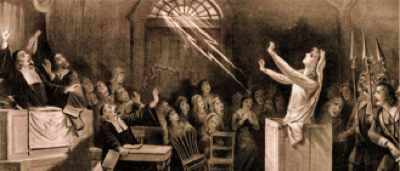
The Massachusetts witch trials of the late 17th century – which reached an infamous climax in the town of Salem, in 1692 – remain some of the most fascinating cases of mass hysteria known to history. At first glance, the notoriety peculiar to the Salem trials seems a little unwarranted: of the estimated tens-of-thousands of people who were put to death as witches during the early modern period, only nineteen were inhabitants of Salem (five more died awaiting execution). But the probable reason for Salem’s continued place in the world’s collective memory, is the unusual extent of documentation related to the trials, which – such as by the case of elderly farmer Giles Cory – survives to horrify anybody who cares to read about the proceedings.
The atmosphere in Salem – long characterized by family feuds, property disputes, and skirmishes with Native Americans – made the inhabitants ripe to be afflicted by herd frenzy. Only a slight provocation was therefore needed to induce madness, and this provocation came soon enough when two local girls – Betty Parris and Abigail Williams – began to exhibit the strange symptoms of an ailment, whose cause could not be found by the doctors. It was decided that the source of their erratic behaviour must be witchcraft. Three women – a homeless beggar, a slave, and a lady who had failed to attend church meetings – were quickly apprehended, charged with witchcraft, and imprisoned. A respectable, church-going woman by the name of Martha Corey protested their innocence – clear evidence, apparently, that she herself was guilty of witchcraft. As more and more accusations were flung between the townspeople, the court sought advice on how to proceed from some of the most influential church ministers in New England. The ministers ensured many further executions by advising that the trials should continue, since it was deplorable, in their opinion, that the inhabitants of Massachusetts should go on ‘suffering molestations from the invisible world.’
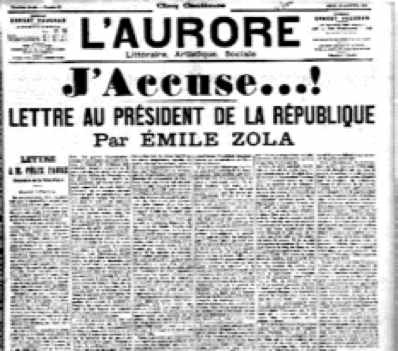
‘I have only one passion, that of the light, in the name of humanity which has suffered so and is entitled to happiness. My ignited protest is nothing more than the cry of my heart.’ – Emile Zola, J’Accuse, 1898
Alfred Dreyfus, a French artillery captain of Jewish descent, was arrested in 1894 for passing secret information to the German government. The next year he was convicted of treason before a military court, and sentenced to life imprisonment. This could easily have been the end of the story: such things happened all the time in the modern world, and for more than a year it seemed that the case was closed. But in 1896, the new chief of military intelligence discovered evidence that another officer – Major Esterhazy – could well be responsible for the treason. Dreyfus, it seemed, was innocent. The man who made this discovery was promptly transferred to Tunisia; the military, by maintaining a convenient silence, sought to save its own reputation.
But to Paris, the truth inexorably marched, and the awaited storm burst. When the media learned of the cover-up, the affair erupted into a scandal which polarised fin de siècle France, and which soon became the most hotly debated political event of the day. Intellectuals were divided into Dreyfusards and anti-Dreyfusards; counted among the former was the famous writer Èmile Zola, who published his timeless statement of the case, ‘J’accuse!’, in 1898. In this open letter to the President of the French Republic – necessary reading for any aspiring journalist – Zola, driven to the heights of indignation, demanded ‘truth and justice’ for Dreyfus. He called the flimsy trial and subsequent cover-up ‘one of the greatest iniquities of our century’, and a clear symptom of the anti-Semitism so rife in France at the time. ‘Dreyfus knows several languages – crime!’ he thundered, paraphrasing the inept military court: ‘One found at his place no compromising papers – crime! He returns sometimes to his country of origin – crime! He is industrious, he wants to know everything – crime! He is unperturbed – crime! He is perturbed – crime!’
Zola, along with many other leading lights of liberalism, demanded a retrial for Dreyfus. Their efforts were resisted by the French government; Zola was convicted of criminal libel and fled to England to escape imprisonment. ‘Today the positions are clear,’ he wrote. ‘On the one hand, there are the culprits who do not want the light to come; on the other, there are the carriers of justice who will give their life to see it come.’ But the ‘truth was on the march,’ and eventually, as Zola had predicted, Dreyfus was pardoned in 1902 and four years later completely exonerated, going on to serve France in the Great War.
‘It is better that I should die a thousand times than that I should retract one syllable of the condemned articles. And as they excommunicated me for the sacrilege of heresy, so I excommunicate them in the name of the sacred truth of God. Christ will judge whose excommunication will stand.’ – Martin Luther
The trial of German priest Martin Luther marked the dawn of the great Protestant Reformation, the dramatic schism of the Catholic Church which sent aftershocks, in the form of religious wars, rippling across Europe, and which began to divide the continent into its modern framework of nation-states. Luther did not mean to spark a revolution: initially, like many others, he merely found his sincere piety upset by the doctrines of the Catholic Church, and hoped to ‘elicit the truth about the sacrament of penance.’
In 1516, Luther began preaching against what were to him the more odious doctrines of the Church. In particular, he was disgusted by the common practice among the clergy of selling ‘indulgences’, which thereby encouraged the faithful – and the faithless – to buy their way into heaven with gold. He nailed his ninety-five proposals for doctrinal reform to the door of Wittenberg Castle Church for debate. ‘Luther is a drunken German,’ said Pope Leo X, reportedly, when he heard of the Ninety-Five Theses. ‘He will feel different when he is sober.’ But sobriety brought no change of heart. In 1518, Luther was charged with heresy, and in 1521 he appeared before the Diet of Worms. Challenged to recant the heretical sentences in his works, he refused, famously saying: ‘Here I stand. I cannot do otherwise. God help me. Amen.’ The resulting Edict of Worms found him guilty of heresy, and determined that his books should be burned, that he should be apprehended, and that those who gave him shelter should be liable to prosecution. Luther escaped to the castle of his benefactor, Frederick the Wise, and managed to live the remainder of his life in freedom.

‘The blow I saw given . . . I remember well, there was such a groan by the Thousands then present as I never heard before and desire I may never hear again.’ – A witness to the execution of Charles I, 1649
Charles I, the photogenic king of Great Britain and Ireland, was brought to trial in 1649 at the behest of Oliver Cromwell and his Parliamentarians. For the past decade, he had waged civil war against these men, who sought to deprive him of his often-misused regal power. The king’s behaviour at the close of the civil war, and his repeated efforts to interfere with Cromwell’s aims, severely diminished the chance that his life might be spared – in spite of the fact that he still enjoyed the support, or at least the forgiveness, of many in his former domain. A revolutionary tribunal was created. It declared that Charles was a traitor and a tyrant; his head was severed in front of the banqueting hall of his own palace, before a crowd of thousands.
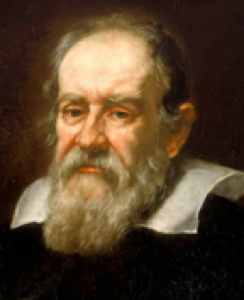
‘My dear Kepler, I wish that we might laugh at the remarkable stupidity of the common herd.’ – Galileo Galilei, letter to fellow-scientist Johannes Kepler
Nicolaus Copernicus had already proposed an heliocentric model of the solar system in 1543. This contradicted the commonly accepted geocentric model, originating in Ptolemy and receiving credence through Aristotle, which saw the planets and the stars revolving around the stationary earth. Galileo’s great crime was to expand upon the innovations of Copernicus. In his Dialogue Concerning the Two Chief World Systems, Galileo had put the geocentric arguments of his increasingly distant friend Pope Urban VIII into the mouth of a simpleton. This completed the process of alienation from his last great supporter: the arbiters of public opinion turned their backs on Galileo, scribbled against his integrity, and very soon – in 1632 – he was called to Rome to stand trial for heresy.
According to the papal condemnation, ‘the proposition that the Sun is the center of the world and does not move from its place is absurd and false philosophically and formally heretical, because it is expressly contrary to Holy Scripture.’ Galileo was forced to repudiate the opinions he had uttered, and sentenced to house arrest, under which he lived out the rest of his life.
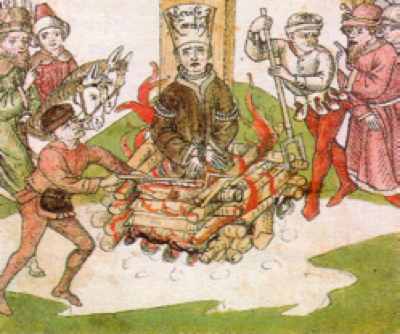
‘God is my witness that the things charged against me I never preached. In the same truth of the Gospel which I have written, taught, and preached . . . I am ready to die today.’ – John Hus, 1415
John Hus was the perfect example of a man who appears in the world a little too soon, who thinks a little too far ahead of his time, and who therefore suffers at the hands of his contemporaries. His ideas were unpalatable. The spirit of reform, which so characterised the 16th century and which gained such support for Martin Luther and many others, surged too early in the breast of this 15th century Czech philosopher-priest. Invited to Konstanz to participate in a reconciliatory council of the Church, Hus was soon imprisoned on a whim and brought to trial. He was pressured to recant his heresy, but he insisted that his beliefs were not heretical, and that to agree that they were such would be a falsehood – a dishonesty which his conscience could not bear. After being tied to the stake, he was given one last chance to recant, but once again refused, reaffirming that he had not preached the heresy with which he had been charged. It was only after his death at the stake in 1415 that many Czechs rose to support his doctrines, thus sparking the Hussite Wars of 1420-31, during which Hussite forces defeated no less than five papal crusades. Martin Luther later wrote that he ‘could not understand for what cause they had burnt so great a man, who explained the Scriptures with so much gravity and skill.’
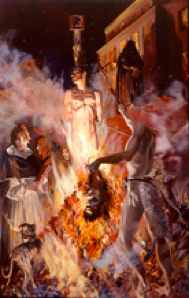
Giordano Bruno, an Italian friar and astronomer of the 16th century, was – you guessed it – brought to trial for heresy, this time by the Inquisition. Among other crimes, he was adamant that the Sun was a star, and that the stars were suns like our own. He believed that the universe might be populated by planets containing intelligent life forms. Like the much-persecuted Dutch philosopher Spinoza, Bruno was a pantheist; he maintained, contrary to Church doctrine, that everything in the universe was divine. He was burned at the stake in 1600 after a dramatic seven-year trial in which he refused to completely renounce his heresies. Amazingly, as recently as 2000 an Italian cardinal declared that although Bruno’s death was indeed a ‘sad episode,’ the Inquisitors who ordered his death ‘had the desire to serve freedom and promote the common good and did everything possible to save his life.’
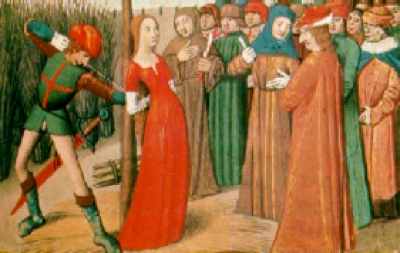
Joan of Arc, after being captured in 1431 at the age of 19, was also tried for heresy. Many circumstances surrounding the trial didn’t exactly work in Joan’s favour: it was conducted, for example, before a jury of entirely hostile ecclesiastics. Many pro-French clerics, with both the desire and the authority to defend her from the charge, were not allowed to participate. She was declared guilty and sentenced to lifelong imprisonment. Inside prison, she began wearing male clothing to avoid molestation by the British guards. This provided the authorities with the justification they needed to, predictably, execute her as a relapsed heretic. 25 years later, the disgraceful injustice of the trial was recognised by the Church, and the verdict was overturned. Nearly 500 years later, Joan of Arc was canonised as a saint. Her widespread popularity can be explained by her remarkable story, and especially by the courage with which this young woman – like so many before and after her – faced an unjust death at the hands of cruel men.

‘If you think that by killing men you can avoid the accuser censoring your lives, you are mistaken. That is not a way of escape which is either possible or honorable; the easiest and the noblest way is not to be crushing others, but to be improving yourselves.’ – Socrates
Socrates – perhaps the most memorable of Greek philosophers after Diogenes the Cynic – was put to death by his fellow Athenian citizens in 399BC. He was officially charged with impiety and the corruption of the Athenian youth. He was said to be ‘an evil-doer and curious person, searching into things under the earth and above the heaven.’ He made ‘good things seem bad, and bad things seem good.’ These charges were unjust, but not unfounded – his manner of pointing out people’s ethical mistakes had certainly become annoying, in the same way that a gadfly might annoy a horse. It became dangerous to walk the streets of Athens – Athenians never knew when Socrates would come striding out of the blue to morally assault their unexamined opinions.
At the trial, Socrates gave a powerful speech in his own defense. ‘Unlike other men,’ he began, ‘I do not know how to be eloquent. All I know how to do is to speak the truth; and that is all I have ever tried to do; and that is what I will now proceed to do.’ He went on to defend himself beautifully, but was eventually found guilty by a majority of votes. It was then open to him, by Athenian law, to propose a punishment less harsh than death. Rather than proposing a reasonable punishment like any sensible man, Socrates suggested a fine of thirty minae – a sum so blatantly insignificant as to infuriate the jury. More people voted for the death penalty than had voted for his guilt – a tell-tale sign that Socrates knew how to lose friends, and to make enemies, rather quickly. After receiving the verdict, Socrates left the courtroom, saying: ‘The hour of departure has arrived, and we go our ways – I to die, and you to live. Which is better, only God knows.’
After the trial, he was taken to prison and forced to drink hemlock. Surrounded by his friends, he spent his final moments engaged in discourse on the immortality of the soul. As his feet and his legs went numb with the poison, he continued to speak of what he thought was true and just, until at last he died – having always maintained that it is better to suffer injustice at the hands of others, than to be unjust oneself.

‘But I say to you, love your enemies, bless those who curse you, do good to those who hate you, and pray for those who spitefully use you and persecute you’ – Matthew 5:44
Few of history’s echoes have reverberated so violently as the trial and subsequent crucifixion of Jesus. He was apprehended at an olive grove outside Jerusalem, having been betrayed by Judas Iscariot after the Last Supper. His captors took him to the house of the Jewish high priest, where an ad-hoc judiciary known as the Sanhedrin had assembled. He spoke little, and despite being beaten and mocked before the Jewish assembly, he refused to deny that he was the Son of God. The outraged high priest proceeded to tear his own clothes, and posed a question to all those present: ‘What further need have we of witnesses? Ye have heard the blasphemy: what think ye?’ And they all condemned Jesus to be worthy of death.
The next morning, the high priests presented him to the Roman governor of Judaea, Pontius Pilate. They urged Pilate to punish him with crucifixion, but Pilate expressed doubts as to whether or not Jesus was guilty. However, when the gathering crowd loudly demanded that Jesus be crucified; Pilate, ‘wishing to content the multitude’, delivered Jesus into their hands. Whereupon he was taken by the enemies he loved, and crucified, resoundingly, at Golgotha.





![Top 10 Haunting Images Of Historic Tragedies [DISTURBING] Top 10 Haunting Images Of Historic Tragedies [DISTURBING]](https://listverse.com/wp-content/uploads/2020/05/33758v-150x150.jpg)


